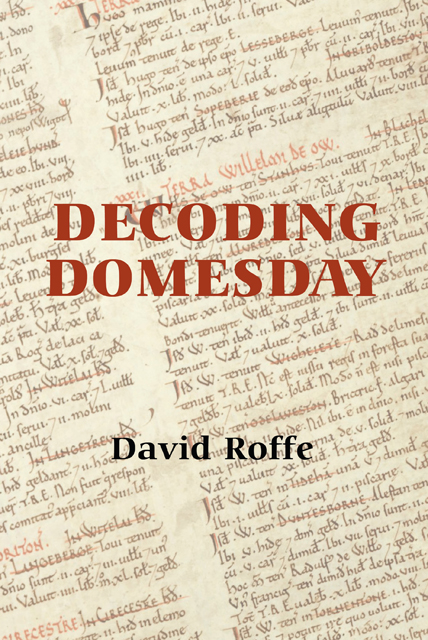Book contents
- Frontmatter
- Contents
- Tables
- Dedication
- Preface
- Acknowledgements
- Abbreviations
- 1 Domesday Past and Present
- 2 The Domesday Texts
- 3 The Inquest and the Book
- 4 The Domesday Boroughs
- 5 Lordship, Land, and Service
- 6 The Vill and Taxation
- 7 The Economy and Society
- 8 The Communities of the Shire
- 9 The Beyond of Domesday
- 10 Domesday Now
- Appendix The main entry forms of GDB
- Bibliography
- Index
7 - The Economy and Society
Published online by Cambridge University Press: 10 March 2023
- Frontmatter
- Contents
- Tables
- Dedication
- Preface
- Acknowledgements
- Abbreviations
- 1 Domesday Past and Present
- 2 The Domesday Texts
- 3 The Inquest and the Book
- 4 The Domesday Boroughs
- 5 Lordship, Land, and Service
- 6 The Vill and Taxation
- 7 The Economy and Society
- 8 The Communities of the Shire
- 9 The Beyond of Domesday
- 10 Domesday Now
- Appendix The main entry forms of GDB
- Bibliography
- Index
Summary
In the transitionfrom lordship and tax assessment to stocking and value, the Domesday entry appears to move from the ineffable to the real. And as such, with a collective sigh of relief, have economic and social historians tended to treat the details of the lord's demesne, his ploughs, the population of the manor, and its resources in ploughs, meadow, woodland, pasture, churches, mills and the like, and finally value. None would now espouse the nineteenth-century view that Domesday is an exhaustive survey of communities, but it is widely assumed that it provides a comprehensive picture of the economic underpinning of lordship in 1086. In any assessment of Domesday data, it would seem that it is de rigueur to protest that commodities in land and services were recorded because they contributed to the income of the lord's demesne.
This much has been common ground. Where there has been disagreement, it has been over the degree to which Domesday Book provides a measure of real incomes and how those incomes represent the wealth of England. While accepting that the inquest was an inventory survey, many have followed Lennard's lead in interpreting Domesday values as actual or potential lease values. Most of the figures are multiples of standard units of account, whether they be shillings, pounds or orae of sixteen pence, and as such can hardly represent the sum totals of discrete renders. Moreover, many estates produced more than what they were assessed at. Domesday provides what is essentially a rental value. The actual productivity of estates, it is argued, must have been higher to allow for the subsistence and profit of the lessee, suggesting that the dependent peasantry produced a surplus that is not represented in Domesday Book. Against this, Graeme Snooks has argued that the statistical ‘fit’ between value and resources is so exact that it will not allow any possibility of a surplus of this kind. Domesday values must be a measure of the net income of the lord, that is the productivity of the estate less the subsistence of the dependent peasantry. Only the lands of free men and sokemen, usually separately valued, stand outside the lord's demesne.
- Type
- Chapter
- Information
- Decoding Domesday , pp. 210 - 256Publisher: Boydell & BrewerPrint publication year: 2015



